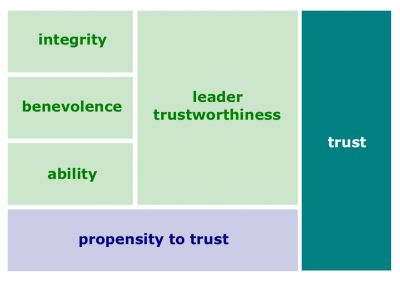Difference between revisions of "Trust"
(→Related coursework) |
MariamKhalid (talk | contribs) |
||
| Line 4: | Line 4: | ||
According to [[Organizational Behavior by Robbins and Judge (17th edition)]], | According to [[Organizational Behavior by Robbins and Judge (17th edition)]], | ||
:[[Trust]]. A positive expectation that another will not act opportunistically. | :[[Trust]]. A positive expectation that another will not act opportunistically. | ||
| + | According to [[Management by Robbins and Coulter (14th edition)]], | ||
| + | :[[Trust]]. The belief in the integrity, character, and ability of a [[leader]]. | ||
| + | |||
| + | |||
==Key concepts== | ==Key concepts== | ||
| Line 12: | Line 16: | ||
*[[Leadership Quarter]]. | *[[Leadership Quarter]]. | ||
| − | [[Category: Septem Artes Administrativi]][[Category: Articles]] | + | [[Category:Management]][[Category: Septem Artes Administrativi]][[Category: Articles]] |
Revision as of 16:34, 3 June 2020
Trust is a positive expectation that another will not act opportunistically. For a leader, trust is the belief in the integrity, character, and ability to lead.
Definitions
According to Organizational Behavior by Robbins and Judge (17th edition),
- Trust. A positive expectation that another will not act opportunistically.
According to Management by Robbins and Coulter (14th edition),
Key concepts
- Trust propensity. How likely an employee is to trust a leader.
- Identification-based trust. Trust based on a mutual understanding of each other's intentions and appreciation of each other's wants and desires.
